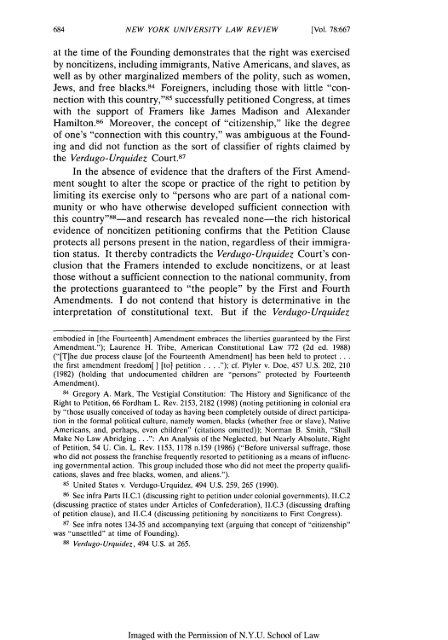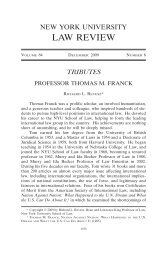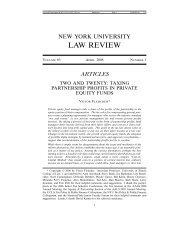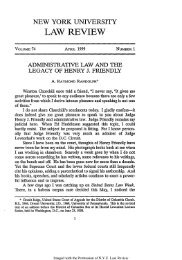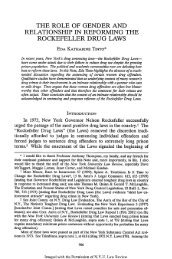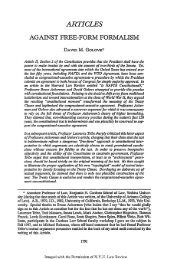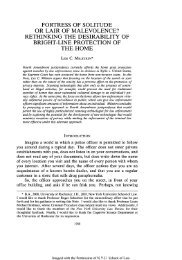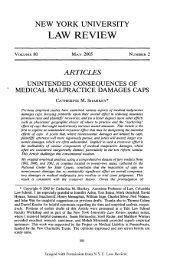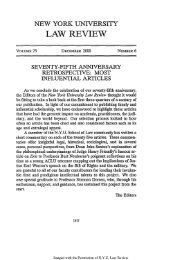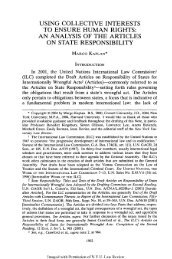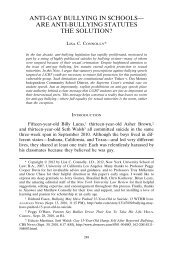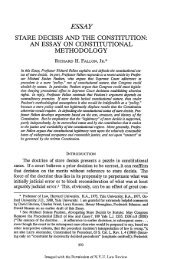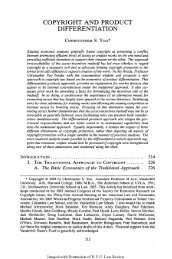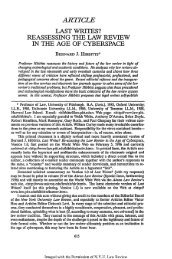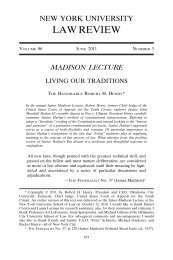Immigrants and the Right to Petition - NYU Law Review
Immigrants and the Right to Petition - NYU Law Review
Immigrants and the Right to Petition - NYU Law Review
Create successful ePaper yourself
Turn your PDF publications into a flip-book with our unique Google optimized e-Paper software.
Imaged with <strong>the</strong> Permission of N.Y.U. School of <strong>Law</strong><br />
NEW YORK UNIVERSITY LAW REVIEW<br />
[Vol. 78:667<br />
at <strong>the</strong> time of <strong>the</strong> Founding demonstrates that <strong>the</strong> right was exercised<br />
by noncitizens, including immigrants, Native Americans, <strong>and</strong> slaves, as<br />
well as by o<strong>the</strong>r marginalized members of <strong>the</strong> polity, such as women,<br />
Jews, <strong>and</strong> free blacks. 84 Foreigners, including those with little "connection<br />
with this country," 8 5 successfully petitioned Congress, at times<br />
with <strong>the</strong> support of Framers like James Madison <strong>and</strong> Alex<strong>and</strong>er<br />
Hamil<strong>to</strong>n.<br />
6<br />
Moreover, <strong>the</strong> concept of "citizenship," like <strong>the</strong> degree<br />
of one's "connection with this country," was ambiguous at <strong>the</strong> Founding<br />
<strong>and</strong> did not function as <strong>the</strong> sort of classifier of rights claimed by<br />
<strong>the</strong> Verdugo-Urquidez Court. 87<br />
In <strong>the</strong> absence of evidence that <strong>the</strong> drafters of <strong>the</strong> First Amendment<br />
sought <strong>to</strong> alter <strong>the</strong> scope or practice of <strong>the</strong> right <strong>to</strong> petition by<br />
limiting its exercise only <strong>to</strong> "persons who are part of a national community<br />
or who have o<strong>the</strong>rwise developed sufficient connection with<br />
this country"81 8 -<strong>and</strong> research has revealed none-<strong>the</strong> rich his<strong>to</strong>rical<br />
evidence of noncitizen petitioning confirms that <strong>the</strong> <strong>Petition</strong> Clause<br />
protects all persons present in <strong>the</strong> nation, regardless of <strong>the</strong>ir immigration<br />
status. It <strong>the</strong>reby contradicts <strong>the</strong> Verdugo-Urquidez Court's conclusion<br />
that <strong>the</strong> Framers intended <strong>to</strong> exclude noncitizens, or at least<br />
those without a sufficient connection <strong>to</strong> <strong>the</strong> national community, from<br />
<strong>the</strong> protections guaranteed <strong>to</strong> "<strong>the</strong> people" by <strong>the</strong> First <strong>and</strong> Fourth<br />
Amendments. I do not contend that his<strong>to</strong>ry is determinative in <strong>the</strong><br />
interpretation of constitutional text. But if <strong>the</strong> Verdugo-Urquidez<br />
embodied in [<strong>the</strong> Fourteenth] Amendment embraces <strong>the</strong> liberties guaranteed by <strong>the</strong> First<br />
Amendment."); Laurence H. Tribe, American Constitutional <strong>Law</strong> 772 (2d ed. 1988)<br />
("[Tihe due process clause [of <strong>the</strong> Fourteenth Amendment] has been held <strong>to</strong> protect...<br />
<strong>the</strong> first amendment freedom[] [<strong>to</strong>] petition .... "); cf. Plyler v. Doe, 457 U.S. 202, 210<br />
(1982) (holding that undocumented children are "persons" protected by Fourteenth<br />
Amendment).<br />
84 Gregory A. Mark, The Vestigial Constitution: The His<strong>to</strong>ry <strong>and</strong> Significance of <strong>the</strong><br />
<strong>Right</strong> <strong>to</strong> <strong>Petition</strong>, 66 Fordham L. Rev. 2153, 2182 (1998) (noting petitioning in colonial era<br />
by "those usually conceived of <strong>to</strong>day as having been completely outside of direct participation<br />
in <strong>the</strong> formal political culture, namely women, blacks (whe<strong>the</strong>r free or slave), Native<br />
Americans, <strong>and</strong>, perhaps, even children" (citations omitted)); Norman B. Smith, "Shall<br />
Make No <strong>Law</strong> Abridging...": An Analysis of <strong>the</strong> Neglected, but Nearly Absolute, <strong>Right</strong><br />
of <strong>Petition</strong>, 54 U. Cin. L. Rev. 1153, 1178 n.159 (1986) ("Before universal suffrage, those<br />
who did not possess <strong>the</strong> franchise frequently resorted <strong>to</strong> petitioning as a means of influencing<br />
governmental action. This group included those who did not meet <strong>the</strong> property qualifications,<br />
slaves <strong>and</strong> free blacks, women, <strong>and</strong> aliens.").<br />
85 United States v. Verdugo-Urquidez, 494 U.S. 259, 265 (1990).<br />
86 See infra Parts II.C.1 (discussing right <strong>to</strong> petition under colonial governments), II.C.2<br />
(discussing practice of states under Articles of Confederation), I1.C.3 (discussing drafting<br />
of petition clause), <strong>and</strong> II.C.4 (discussing petitioning by noncitizens <strong>to</strong> First Congress).<br />
87 See infra notes 134-35 <strong>and</strong> accompanying text (arguing that concept of "citizenship"<br />
was "unsettled" at time of Founding).<br />
88 Verdugo-Urquidez, 494 U.S. at 265.


